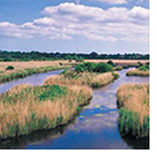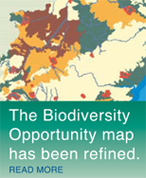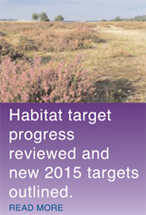| We are fortunate to live in one of the most biodiversity-rich areas in England |
A challenging task
The East of England faces many challenges. Not only is it one of the most intensely farmed, but it is also amongst the fastest growing areas in the country and, as such, is at considerable risk from climate change. This mix of pressures means that the regional natural environment is perceived to be at a tipping point.
A Delivery Plan
To ensure a more robust natural environment, and recovery where it is needed, the Forum has developed a detailed Delivery Plan. This Plan has been designed to enable the East of England to tackle the six challenges it is facing in an organised and coherent fashion.
The six challenges
The Forum has identified six broad challenges facing biodiversity in the East of England:
 'Networking nature' more > 'Networking nature' more > |
 |
 Realising biodiversity's true value more > Realising biodiversity's true value more > |
 |
 Ensuring there is water more > Ensuring there is water more > |
 |
 Responding to a changing coast more > Responding to a changing coast more > |
 |
 Safeguarding the seas more > Safeguarding the seas more > |
 |
 Enhancing the evidence base more > Enhancing the evidence base more > |
Successfully meeting these will strengthen this Region’s natural environment, thereby increasing prosperity and improving everyone’s well being.
Meeting these challenges will help meet our three core goals:
i. secure a resilient environment
ii. demonstrate that people in the Region benefit from its biodiversity
iii. ensure that biodiversity is perceived to be at the heart of Regional policy-making
Challenge 1: 'Networking nature'
 The Forum recognises that traditional conservation methods tended to create small, isolated sites. To achieve a more connected landscape the Forum needs to harness local conservation activity to contribute to a strategic and holistic vision of the East of England’s natural environment. This objective will require functional linking of natural sites, hence ‘Networking nature’. The Forum recognises that traditional conservation methods tended to create small, isolated sites. To achieve a more connected landscape the Forum needs to harness local conservation activity to contribute to a strategic and holistic vision of the East of England’s natural environment. This objective will require functional linking of natural sites, hence ‘Networking nature’.
The Forum has ensured its environmental opportunity map has been adopted at the regional level and appreciates it now needs to encourage local development frameworks to integrate ‘networking nature’ opportunities into their local plans.
Back to top
Challenge 2: 'Realising biodiversity's true value'
 Biodiversity has much to offer. It contributes to the East of England’s economic prosperity. It makes a social contribution too. Yet authorities too often overlook its value and the public, who know little about it and have restricted access to it. Biodiversity has much to offer. It contributes to the East of England’s economic prosperity. It makes a social contribution too. Yet authorities too often overlook its value and the public, who know little about it and have restricted access to it.
The Forum is aiming to make both authorities and the public better aware of biodiversity’s contributions and ensure access to it is increased.
Back to top
Challenge 3: 'Ensuring there is water'
 A good supply of water is vital for the East of England’s most important inland habitats. However, the twin pressures of climate change and population growth mean it is becoming an ever-scarcer resource. To ensure adequate supplies of clean water are available for both wildlife and people, the Forum advocates achieving the objectives of the European Water Framework Directive to improve the way rural land is managed; reduce the impact of transport and built environments on water quality; address localised sources of pollution, so as to secure sustainable amounts of water and to improve wildlife habitats. A good supply of water is vital for the East of England’s most important inland habitats. However, the twin pressures of climate change and population growth mean it is becoming an ever-scarcer resource. To ensure adequate supplies of clean water are available for both wildlife and people, the Forum advocates achieving the objectives of the European Water Framework Directive to improve the way rural land is managed; reduce the impact of transport and built environments on water quality; address localised sources of pollution, so as to secure sustainable amounts of water and to improve wildlife habitats.
The Forum is also actively involved in helping to deliver the Wetland Vision for England. This Vision is a joint project between Natural England, the Environment Agency, English Heritage, The Wildlife Trusts and the RSPB. The Vision sets out the mutual aspirations of these organisations for the conservation, restoration and creation of freshwater wetlands in England over the next 50 years.
Back to top
Challenge 4: 'Responding to a changing coast'
 With much of the East of England’s coast and estuaries of international significance for wildlife and/or habitats, over 60% of it is already environmentally designated. Yet most of it is threatened by climate change triggering increased flooding, erosion and coastal squeeze. Nevertheless the Forum is aiming for long-term sustainability by making space for nature in advance of this anticipated freshwater, saltmarsh and mudflat habitat loss. With much of the East of England’s coast and estuaries of international significance for wildlife and/or habitats, over 60% of it is already environmentally designated. Yet most of it is threatened by climate change triggering increased flooding, erosion and coastal squeeze. Nevertheless the Forum is aiming for long-term sustainability by making space for nature in advance of this anticipated freshwater, saltmarsh and mudflat habitat loss.
Back to top
Challenge 5: 'Safeguarding the seas'
 The biodiversity of the marine environment, along with its sea and shellfisheries capacities, are compromised. In fact, due to cumulatively damaging human interventions, this environment is in some areas in significant decline. The threat of climate change is set to further compound this circumstance. The biodiversity of the marine environment, along with its sea and shellfisheries capacities, are compromised. In fact, due to cumulatively damaging human interventions, this environment is in some areas in significant decline. The threat of climate change is set to further compound this circumstance.
The introduction of the Marine Bill is seen as critical. Principally the Bill is concerned with the establishment of an independent Marine Management Organisation and, by 2012, a network of Marine Protection Areas. The Forum will do all it can to ensure the Bill’s aims are achieved – in particular.
Back to top
 Challenge 6: 'Enhancing the evidence base' Challenge 6: 'Enhancing the evidence base'
In order for the Forum to effectively tackle its various targets it needs a good combination of local and regional data on which to base conservation decisions and allocate the often scarce conservation resources.
In the East of England there is both a gap between the demand for data and its supply, as well as some deficiencies in its quality. The Forum intends to address this gap and overcome the data shortcomings in order to be better able to address UK BAP (see Glossary) priority habitats and species requirements.
Back to top |




